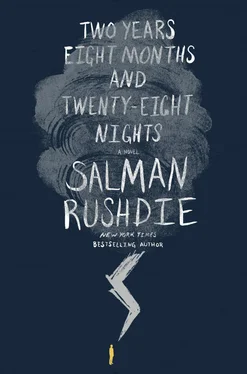In American mouths “Hieronymus” quickly became “Geronimo” and he enjoyed, he had to admit, the Indian-chiefy allusion. He was a big man like his father with big competent hands a thick neck and hawkish profile and with his Indian-Indian complexion and all, it was easy for Americans to see the Wild West in him and treat him with the respect reserved for remnants of peoples exterminated by the white man, which he accepted without clarifying that he was Indian from India and therefore familiar with a quite different history of imperialist oppression, but never mind. Uncle Charles Duniza (he had changed the spelling of his surname, he said, to accommodate Americans’ Italianate tastes) also lacked earlobes and had the family gift of height. He was white haired with bushy white eyebrows, his fleshy lips habitually stretched in a gentle disappointed smile, and in his modest architectural practice did not allow politics to be discussed. When he took twenty-two-year-old Geronimo to drink at an inn run by the Genovese family for drag queens and male hookers and transgendered persons, he wanted to speak only of sex, the love of men and men, which horrified and delighted his Bombay nephew who had never spoken of such matters before and to whom they had until now remained a mystery. Father Jerry, being a conservative of the right type, considered homosexuality a thing beyond the pale, to be treated as if it did not exist. But now young Geronimo was living in his homosexual uncle’s run-down brownstone on St. Mark’s Place and the house was full of Uncle Charles’s protégés, half a dozen gay Cuban refugees whom Charles Duniza, with a lighthearted, dismissive wave of the hand, collectively referred to as the Raúls. The Raúls were to be found in the bathrooms at odd hours plucking their eyebrows or languidly shaving the body hair off their chests and legs before heading out in search of love. Geronimo Manezes had no idea how to speak to them but that was okay because they had no interest in speaking to him either. He had always exuded powerfully heterosexual pheromones which induced, in the Raúls, small moues of indifference that said, You can coexist in this space with us if you must, but please know that in all essential ways you don’t exist for us at all.
As he watched them prance away into the night, Geronimo Manezes found that he envied them their carelessness, the ease with which they had shed Havana like an unwanted snakeskin, navigating this new city with their ten words of bad English, diving into the polyglot urban sea and feeling instantly at home, or, at least, adding their easy, brittle, angry, damaged misfittery to all the other square pegs in the round holes all around them, using bathhouse promiscuity to create the feeling of belonging. He wanted to be that way too, he realized. He felt what the Raúls felt: now that he was here, in this broke, dirty, inexhaustible, dangerous, irresistible metropolis, he was never going home.
Like so many unbelievers Geronimo Manezes was looking for paradise, but Manhattan Island then was anything but Edenic. After the riots that summer Uncle Charles gave up the Mafia inn. A year later he would march with the pride marchers, but uncomfortably. He wasn’t a natural protester. Reading Voltaire’s Candide, he declared himself in agreement with the tragicomic philosopher Pangloss: Il faut cultiver son jardin. “Stay home, go to work, attend to business,” he advised his nephew Geronimo. “This solidarity cum activism thing: I don’t know.” He was cautious by nature, a member of an association of gay businesspeople which, as Charles Duniza took pride in saying for years afterwards, had been addressed by Ed Koch when he was on the city council, it was the first openly gay organization he spoke to, and everyone had been too courteous to ask the future mayor anything about his own rumored sexual orientation. Charles was a regular attendee at the association’s suit-and-tie gatherings in the Village, and in his own way a conservative like his brother Father Jerry back home. But when the call came to march he put on his Sunday best and joined the wild parade, one of the few formally dressed persons in that defiant carnival of self-assertion. And Geronimo, straight as he was, went with him. By now they were fast friends and it wouldn’t have been right to let Uncle Charles go into battle alone.
The years passed and the architectural practice began to struggle. The walls of the Greenwich Avenue office were lined with dreams: buildings Charles Duniza had never built and would never build. In the late 1980s his friend the celebrated real estate developer Bento V. Elfenbein bought a hundred acres of prime property in Big Groundnut on the South Fork of Long Island — its name was taken from the Pequot Indian word later more usually translated as potato— and wanted a hundred “starchitects” to build signature homes on an acre each. One of these acres was promised to Charles—“Of course you, Charles! What do you think, I don’t remember my friends?” Bento expostulated — but the project remained in the doldrums because of complex financing issues. Uncle Charles’s smile faded a little, became a little sadder. Bento, a dandy with rakishly floppy brown hair and a colorful relationship with cravats, came across as absurdly glamorous and almost shockingly charming, the scion of a big Hollywood dynasty. He was flamboyantly intellectual, with a tendency to quote Thorstein Veblen’s Theory of the Leisure Class with a bitter irony leavened somewhat by his own, indefatigable Hollywood grin, a Joe E. Brown dazzler full of big, bright, white teeth, inherited from a mother who had been on the screen with Chaplin. “The leisure class, a.k.a. the landed gentry, on whom my business depends,” he told Geronimo Manezes, “are the hunters, not the gatherers; they make their way by the immoral road of exploitation, not the virtuous path of industry. But I, to make my way, have to treat the rich as the good guys, the lions, the creators of wealth and guardians of freedom, which naturally I don’t mind doing because I’m an exploiter too and I also want to think of myself as virtuous.”
Bento was proud to bear one version of the first name of the philosopher Spinoza. “In a translation of myself,” he liked to say, “I would be Baruch Ivory. Maybe if I’d stayed in the motion picture business that would have been a better handle. Be that as it may. Here in New Amsterdam, I’m proud to be named after Benedito de Espinosa, Portuguese Jew of Amsterdam the Older. From him I take my famous rationalism, also my knowledge that mind and body are one and Descartes was wrong to separate them. Forget the soul. No such ghost in the machine. What happens to our mind befalls our body also. The condition of the body is also the state of the mind. Remember this. Spinoza said God had a body too, God’s mind and body were one just like ours. For this type of iconoclastic thinking they flung him out of Jewish society. They issued against him in Amsterdam an excommunicating cherem. The Catholics took the hint, put his immortal Ethics on their Index Librorum Prohibitorum. Which doesn’t mean he wasn’t right. He in his turn was inspired by the Andalusian Arab Averroës, who was given a pretty rough ride too, which also didn’t mean he was wrong. In my opinion, by the way, Spinoza’s theory of mind-body union applies equally to nation-states. The body politic and the ones in the control room are not separate from one another. You remember that Woody Allen movie with the operatives in the brain sending the sperm in their white outfits and hoodies to work when the body is about to get laid. Same kind of thing.”
Bento owned a building on Park Avenue South and lunched most days in the oak-paneled restaurant on its ground floor. Here he sometimes invited Geronimo Manezes to talk about the real facts of life. “A person like yourself,” he said, “uprooted, not yet re-rooted, is what my favorite, Thorstein V., called an alien of the uneasy feet. ‘A disturber of the intellectual peace, but only at the cost of becoming an intellectual wayfaring man, a wanderer in the intellectual no-man’s-land, seeking another place to rest, farther along the road, somewhere over the horizon.’ Does that sound like you to you? Or are you, as I’m guessing you are, seeking that resting place closer to home? Not over the rainbow but in the company of, to be frank, my beautiful daughter? Is Ella what you’re looking for to stop you floating away? Your anchor, is that what you want her to be for you, the one who makes your feet feel easy? She’s a kid, twenty-one last March. You’re close to fourteen years her senior. I’m not saying that’s a bad thing. I’m a man of the world. And anyway my princess usually gets what she wants, so let’s leave it to her to decide, okay?” Geronimo Manezes nodded, not knowing what else to do. “So, genug, ” Elfenbein said, smiling his Beverly Hills smile. “Try the Dover sole.”
Читать дальше












